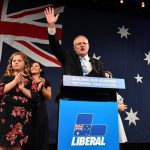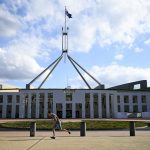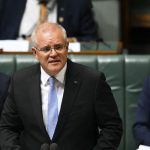Measuring Australia’s economic and social progress
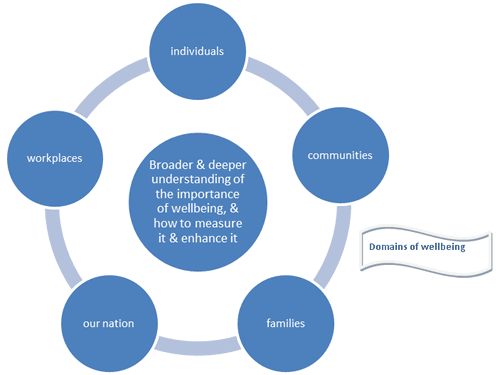
Australian measures of life satisfaction have declined in recent years, despite solid growth in GDP. The Global Access Partners Task Force on Progress in Society, established following the 2010 National Economic Review Summit, has been exploring how the ‘economics of happiness’ could be used to inform national policy.
Since last year, a group of senior public sector, private sector and academic thinkers, brought together under the auspices of Sydney-based public policy think tank Global Access Partners (GAP), has been addressing the issue of measures of progress.
There is a huge worldwide interest in measuring and reporting on happiness or wellbeing. French President Nicolas Sarkozy commissioned Nobel Prize winners Amartya Sen and Joseph Stiglitz, together with Jean Fitoussi, to report to his government on the measurement of economic and social progress. That report looked at the need for broader measures of quality of life to inform policy making.
Australia is a leader in thinking about these issues. Amongst other things:
- The Australian Bureau of Statistics has developed a regular series of measures of Australia’s progress
- The Treasury has adopted a wellbeing framework
- Australian Unity, in partnership with the Australian Centre on Quality of Life at Deakin University regularly measures how satisfied Australians are with their lives and life and publishes a wellbeing index.
There is already a wealth of information about the measurement issues and the pros and cons of different approaches. We tried to avoid revisiting these debates, and have no intention of developing new or competing indices. The task for us was to foster linkages between experts and consider ways in which the measurement of happiness or wellbeing can help both business and government achieve policy objectives.
1. Measuring our quality of life — what do we hope to achieve?
The GAP Task Force on Measuring Progress in Society hopes to see Australians enjoy higher wellbeing — in everyday life, in workplaces, in communities, and as citizens.
We recognise that most measures already mark our nation out as very fortunate. We hope to inspire people to use such measures (and other tools) to protect and further enhance our quality of life, whether as individuals, families, communities and workplaces, or the nation.
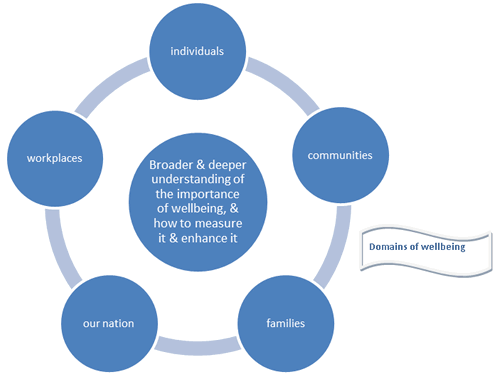
2. What do we mean by ‘wellbeing’?
Wellbeing is a complex concept and we all have a different idea about what it looks like. Nonetheless, many of us would agree that there are some common components, such as our material standard of living, health, connections between people, the quality of the natural environment, freedom, and the right to choose who governs us. The key point is that wellbeing is generally considered to have a range of dimensions, rather than just being about one aspect of life. Decision-making often requires us to take account of complexities and trade-offs as we consider these different dimensions of wellbeing.
The Task Force does not endorse a particular view of wellbeing as one that others should adopt. We hope to provide a resource that people with different ideas of wellbeing could use.
3. Why do we see this task as important?
Most people and institutions intuitively understand that life is about more than just material goods, leisure, or any other single thing. The large number of measurement frameworks that exist indicates a high-level of motivation to develop and apply the principles of wellbeing. But as a coherent and well developed discourse, the wellbeing agenda is in its infancy.
We see this as a good time to promote and progress this discourse. Australia is already a global leader in the field through the ABS’s Measuring Australia’s Progress framework. We see an opportunity to extend this leadership, so that Australia is at the forefront of achieving a broad and deep understanding — and application — of wellbeing principles. This could include achieving a better grasp of the dynamics of driving sustainable improvements in wellbeing over time.
4. What high-level role do we see for the Task Force in promoting this outcome?
We see our role as an ‘influence bridge’ between developers of wellbeing measurement frameworks and toolkits and potential users of these products. Many measurement frameworks have been developed — our role is not to build new frameworks, but to encourage the use of those that are already in play and contribute to their enhancement.
There are three aspects to the influence bridge — motivating, supporting and improving. For each of these, there is potentially a suite of activities.
Motivation could be achieved through engaging with the media, governments and other stakeholders to promote the usefulness of thinking about wellbeing in a structured way and publicising key findings and case studies.
Support could be achieved through providing ready access to, and advice on, a range of tools. This could also involve resources outlining the philosophical and conceptual underpinnings of different approaches to wellbeing and the capabilities that support people to enhance their wellbeing.
Improvement of tools could be achieved through providing feedback, and also acting as a conduit for others to provide feedback.
____________________________________________
Prof Stephen Bartos is a director with international consulting firm Sapere Research Group and Chair of the GAP Task Force on Progress in Society. He is author of two books Against the Grain – The AWB Scandal and Why it Happened (UNSW Press, 2006) and the reference manual Public Sector Governance – Australia (CCH, 2004). He has also written numerous refereed articles in scholarly journals, chapters in academic publications, and regular comment and opinion pieces on governance and fiscal policy, including a regular column in the Public Sector Informant magazine.
Stephen Bartos is an expert in public sector governance, finance, strategy and risk. He is author of two books and has written numerous refereed articles in scholarly journals and regular comment pieces on governance, fiscal policy and financial management.








